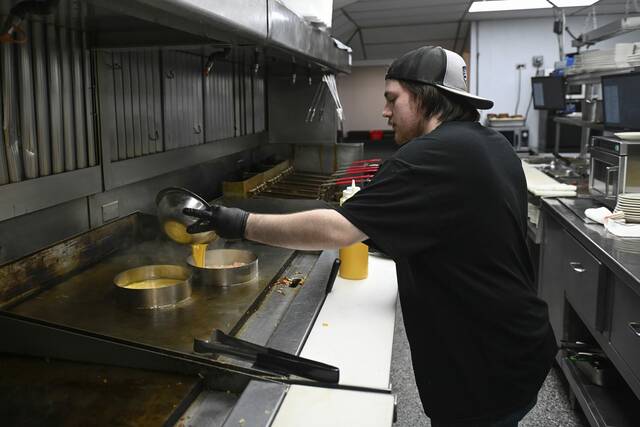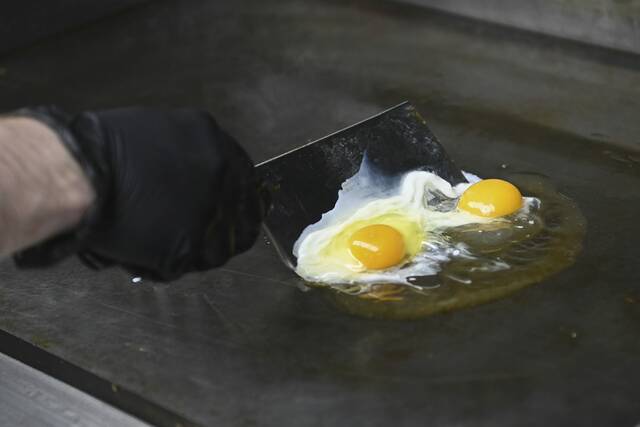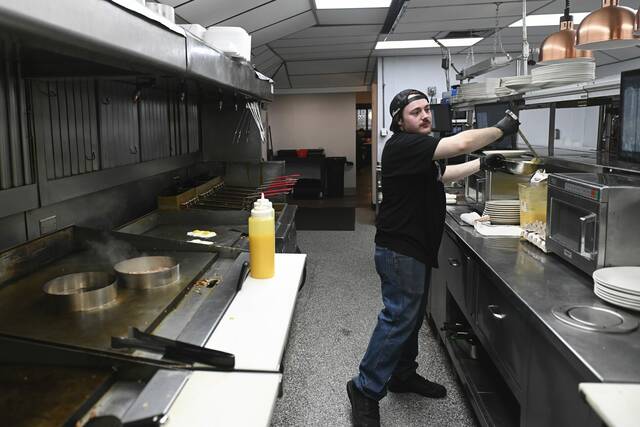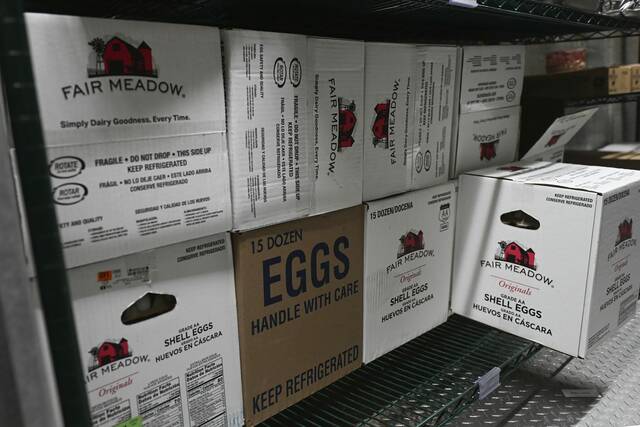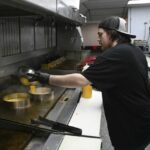Dick’s Diner in Murrysville purchases more than 2,800 eggs every week.
That’s 16 cases, each holding 15 dozen eggs.
But what used to cost the diner $800 a week has skyrocketed to more than double the price — nearly $1,730 every seven days. That’s nearly 62 cents per egg.
General manager Erik Retzer isn’t sure what he will do if the prices don’t drop before Easter, a high-traffic day at a diner known for its eggs, pancakes and omelets.
“This is primarily a breakfast diner, so we’re going to need to serve eggs,” said Retzer, who started working at the 79-year-old restaurant in 2023. “I can’t turn people on to something else.”
Retzer isn’t the only one grappling with the rising costs. There has been a shortage and price increase of eggs at grocery stores across the country as highly pathogenic avian influenza — colloquially known as bird flu — spreads from wild birds to domestic poultry on farms.
It’s a virus that Dr. Lee Harrison, an infectious disease physician and professor of medicine and epidemiology at the University of Pittsburgh School of Medicine, said is a concern.
“We’ve got some worrying things going on,” he said. “It really needs to be watched very carefully.”
There are many influenza strains, and some solely infect wild birds, or birds that migrate south, said Dr. William Schaffner, professor of infectious diseases at Vanderbilt University School of Medicine and former president of the National Foundation for Infectious Diseases.
“As they fly, they occasionally … interact with flocks of domestic poultry,” he said. “They can spread the virus to them. That kind of interferes with the commercial aspects of poultry raising in the United States.”
There’s a shortage of eggs, and eggs cost more because bird flu has infected poultry, said Schaffner. Flocks that are infected have to be culled, or selectively slaughtered.
As of Thursday, more than 148 million poultry were affected, according to the Centers for Disease Control and Prevention.
“It is highly contagious and almost always fatal,” said Shannon Powers, a spokeswoman for the Pennsylvania Department of Agriculture.
The prices of eggs for customers at supermarkets and for restaurants have been rising, even though the state Agriculture Department reported on Monday its first case of avian flu in the state, which occurred at a poultry farm in Lehigh County. While those chickens have been quarantined, the state said the eggs produced on that farm are not harmful to humans as long as the eggs are properly cooked.
18 million fewer eggs
Even without an outbreak of avian flu last year, fewer eggs were produced last month, the Agriculture Department said. Pennsylvania’s production of table eggs fell to 662 million in December, down from 680 million in December 2023, according to the Agriculture Department. Those eggs came from about 3% fewer chickens in December, averaging about 27.2 million last month.
And there is no relief in sight for the imbalance between supply and demand.
“The trend is projected to be a continued shortage of eggs,” said Dustin Heeter, livestock educator for the Penn State Extension office in Westmoreland County.
If costs don’t come down soon, Retzer said, Dick’s Diner will have no choice but to increase its menu prices.
Pittsburgh-based Kelly O’s Diner has already made the jump.
“This is a devastation to the restaurant business, because all restaurants use eggs,” said founder Kelly O’Connor.
The diner has locations in Pittsburgh’s Strip District and the North Hills, as well as Marshall.
“One egg is almost a dollar,” O’Connor said. “That’s almost unheard of. Hopefully, they get a handle on this.”
Just three months ago, Kelly O’s paid between $36 and $51 for a case of 15 dozen eggs, said CEO Seana Lois. The highest price Lois has seen in the past decade came in at $60 per case in 2015, during the last major bird flu outbreak.
The diner increased menu prices to account for the extra cost, O’Connor said.
“This is the first time in 23 years that we have ever directly had to change prices immediately,” she said.
And because ordering new laminated menus to reflect the price changes can cost up to $900, Lois said the diner has switched to paper menus.
“If you look around, there are restaurants going under all of the time,” she said, “because these variables are extremely difficult to forecast.”
But Leechburg restaurant owner Frank Failla is an optimist when it comes to egg costs.
“The truth is,” he said, “I don’t really see it that bad.”
Failla opened Frankie’s on 2nd in 2022. He has worked five decades in the restaurant industry.
At Frankie’s, eggs are most often used for the breakfast dishes — a meal time that tends to yield a higher profit for the restaurant. While Failla is paying more up front, the extra cost is not harming his income.
“It’s not as bad as if steak (prices) went up more,” he said.
But not even Failla is unfazed by the price hike. An order of five cases of eggs used to cost him $300.
Now, it costs nearly $540.
“I don’t like the price,” Failla said.
Nicolas Grunewald, chef and owner of Nico Bakery & Cafe in Greensburg, has been holding steady on the price of his pastries, even though the cost of 10 dozen eggs went from $35 last year to about $100 this year.
Grunewald said he might have to start using a “bucket of eggs” rather than the fresh whole eggs to keep costs down in his baked goods.
“You can’t raise the prices too much or people won’t buy. So I swallow it for the last couple of months,” said Grunewald, a native of France.


